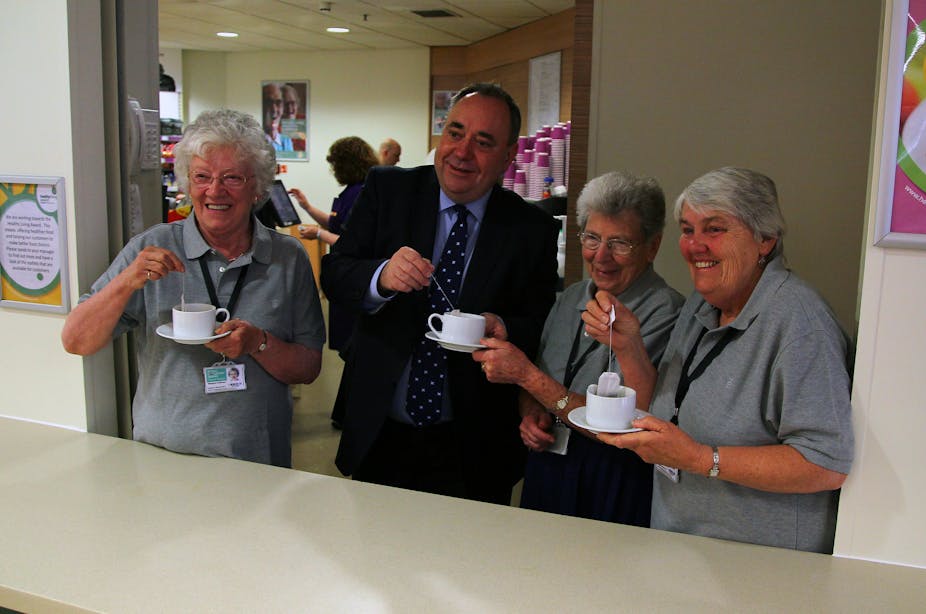David Cameron and other prominent unionists have accused Alex Salmond of desperation over his decision to question the future of the NHS in Scotland if it stays in the UK in recent days.
The first minister’s argument is that the Scottish health budget could be hit in future if the UK equivalent is cut. The problem, say his detractors, is that health is devolved and its budget is within the gift of the Scottish government. We asked our panel who was right.
John McKendrick, Senior Lecturer, Glasgow Caledonian University
When viewed through a global lens, health services north and south of the border share many more similarities than they exhibit differences. Our nearest neighbours geographically are also our nearest neighbours in terms of health service provision. But since devolution, there has been more divergence in health policy, none more evident than in 2011 when Scotland joined Wales (2007) and Northern Ireland (2010) to abolish prescription charges. In recent years, rhetoric surrounding the direction of travel seems to have been diverging apace, with only minority voices supporting a greater role for the private sector north of the border (even if spend contracted out from public to private sector has also increased in Scotland in recent years).
In the longer term, these gaps might well widen. The mixed economy in the NHS down south will probably ramp up as the years go on. If this eventually leads to less public spending on the NHS south of the border, the financing rules for the UK’s other nations under the Barnett formula would mean that there would be less money to spend on health here. This is more of a hypothetical than a real threat in the short term, but it’s perfectly legitimate to raise the issue in this referendum debate.
Is it realistic for the Scottish government to avoid going down the same route as England? It is certainly true that there will be increasing demands upon the public purse. Partly this is demographic, because of the ageing population, and partly technological as treatment possibilities keep improving.
But the principles are important here. There appears to be more commitment in Scotland to a health service that is free at the point of delivery. We don’t like it when that begins to unravel. Obviously plenty of people believe in a public health service down south too, but there are many others who want it scaled back, whether for ideological or pragmatic reasons. The tenor of the debate is different in Scotland.
The SNP government can point to the fact that it has done some things differently. It has found a way to afford this within current budget constraints. So when tough decisions have to be made in future, this indicates that health spending might be protected in Scotland. Of course, whether the SNP would control the government in an independent Scotland is another question entirely.
Yet some polls suggest that more GPs and hospital doctors are inclined to vote no. But polls tend to suggest that that the intention to vote no is stronger for people from their income bracket. It would be interesting to see how their views compared with comparable professions such as lawyers or accountants. The SNP’s support for health is such that I would speculate that doctors and other health professionals might be less inclined to fear independence than those working in other professions.
I am surprised the yes campaign has not made more of the NHS before now. It may be because they wanted to concentrate on the positives of independence rather than the negatives of staying together. Circumstances – specifically, the hit the yes campaign is taking on the currency issue – may be dictating that they cannot afford not to engage the no campaign on their terms.
David McCausland, Head of Economics, University of Aberdeen
The Barnett formula implies that if funding were cut in England, then funding would be cut in Scotland, too. That much is true. But there is nothing to say that NHS spending will be cut, in fact quite the opposite.
Spending on health is likely to increase. Despite concerted attempts to contain health spending, pressures from both an increasing population through in-migration together with an ageing population have meant that demands for health spending have increased and are forecast to continue to do so.
The UK as a whole spends roughly one-twelfth (8%) of our national income on the NHS, compared to one-twentieth (5%) in the 1980s. This is forecast to continue as the population increases and ages. It is also irrelevant whether this spending is internally to NHS institutions or buying care from private providers – it all comes from the same budget.
Thus if the NHS in England were to choose to buy more services from the private healthcare sector, it would not affect the overall budget, and thus not affect funding to Scotland through the Barnett formula. Moreover, such use of private providers is not inconsistent with a public healthcare system focused on the delivery of quality to the patient – for example the Nordic comparator Sweden also uses the private sector (though it has consistently spent more: 9% of GDP since the 1980s).
So Salmond is right only as far as his observations go on the mechanics of the Barnett formula. But he is in all likelihood wrong to imply that NHS spending will be cut in England – most sensible predictions are that it will rise. And he is also playing with emotions in implying that increased use of the private healthcare sector in delivering NHS services would have any impact through the Barnett formula – it won’t. Therefore it is unsurprising that GPs and hospital doctors, like the rest of the population, have not been persuaded by the arguments of the yes campaign.
For our previous weeks’ panel discussions, click here.

